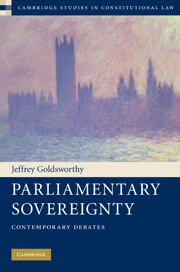Book contents
- Frontmatter
- Contents
- Detailed table of contents
- Acknowledgments
- 1 Introduction
- 2 The myth of the common law constitution
- 3 Legislative sovereignty and the rule of law
- 4 Homogenising constitutions
- 5 Abdicating and limiting Parliament's sovereignty
- 6 Trethowan's case
- 7 Requirements as to procedure or form for legislating
- 8 Judicial review, legislative override, and democracy
- 9 Parliamentary sovereignty and statutory interpretation
- 10 Challenging parliamentary sovereignty: Past, present and future
- Index
- References
9 - Parliamentary sovereignty and statutory interpretation
Published online by Cambridge University Press: 05 October 2010
- Frontmatter
- Contents
- Detailed table of contents
- Acknowledgments
- 1 Introduction
- 2 The myth of the common law constitution
- 3 Legislative sovereignty and the rule of law
- 4 Homogenising constitutions
- 5 Abdicating and limiting Parliament's sovereignty
- 6 Trethowan's case
- 7 Requirements as to procedure or form for legislating
- 8 Judicial review, legislative override, and democracy
- 9 Parliamentary sovereignty and statutory interpretation
- 10 Challenging parliamentary sovereignty: Past, present and future
- Index
- References
Summary
Introduction
How statutes are interpreted is crucial to the implementation of the doctrine of parliamentary sovereignty. The doctrine maintains that every statute that Parliament enacts is legally valid, and therefore that all citizens and officials, including the courts, are legally obligated to obey it. The courts' legal obligation is therefore to interpret and apply every statute in a way that is consistent with Parliament's legal authority to enact it, and their corresponding obligation to obey it. In a small number of cases, what is called ‘interpretation’ might be tantamount to disobedience under cover of a ‘noble lie’. But if that were to become more routine, and generally condoned by the other branches of government, Parliament would no longer be sovereign.
Statutory interpretation is central to debates about many specific issues discussed in the next chapter. The nature and justification of the ultra vires doctrine in administrative law, the protection of common law principles by ‘presumptions’ of legislative intention, the judicial response to statutes in cases such as Anisminic and Factortame, all raise questions about the relationship between statutory interpretation and parliamentary sovereignty. But the topic of this chapter is statutory interpretation in general, including in Australia and New Zealand as well as in Britain, and not in cases to which the Human Rights Act 1998 (UK) applies.
There are two possible methods of investigating how the doctrine of parliamentary sovereignty helps determine the way in which statutes should be interpreted. The first is normative and deductive.
Information
- Type
- Chapter
- Information
- Parliamentary SovereigntyContemporary Debates, pp. 225 - 266Publisher: Cambridge University PressPrint publication year: 2010
References
Accessibility standard: Unknown
Why this information is here
This section outlines the accessibility features of this content - including support for screen readers, full keyboard navigation and high-contrast display options. This may not be relevant for you.Accessibility Information
- 1
- Cited by
